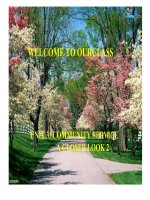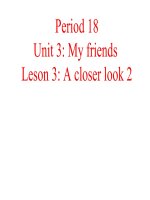English 8 unit 09 natural disasters lesson 3 a closer look 2
Bạn đang xem bản rút gọn của tài liệu. Xem và tải ngay bản đầy đủ của tài liệu tại đây (421.75 KB, 13 trang )
Welcome to English Class8
Unit 9: NATURAL DISASTERS
(A closer look 2)
Let’s learn English !
KIM’S GAME
GAME
Write the NATURAL DISASTERS
flood
forest fire
tsunami
tornado
mudslide
volcano
drought
earthquake
Unit 9:
NATURAL DISASTERS
A CLOSER LOOK 2
Unit 9: NATURAL DISASTERS
(A CLOSER LOOK 2)
1. Read the conversation in GETTING STARTED and underline any sentences in the passive voice that you can find. Check
your findings with a partner.
1. Was anyone injured?
2. ...Only a few minor injuries were reported
3. ...Many houses and public buildings were destroyed ...
4. Thousands of people were left homeless.
5. ... who were trapped in flooded homes
6. ... And equipment have also been sent
7. They’ve been taken to a safe place
8. ...Temporary accommodation will be provided for them.
GRAMMAR
Form:
S + BE + Past participle (PP)...
Unit 9: NATURAL DISASTERS
(A CLOSER LOOK 2)
2. Complete the sentences using the correct passive form of the verbs in brackets.
1.
2.
3.
4.
5.
was scattered
Debris (scatter)…………....……across the countryside by the strong winds last night.
Ten new house (build)…………….in the town every year.
are built
Residents of flooded villages (take)………………to a safe place last night.
were taken
In the future, natural disasters (predict) …………………. accurately with the help of technology.
Food and medicals supplies (deliver)………………...…..later this afternoon.
will be predicted
will be delivered
Unit 9: NATURAL DISASTERS
(A CLOSER LOOK 2)
GRAMMAR: The passive form:
Example:
S+ BE + Past participle (PP)...
People speak English all over the world.
... ......... ......
English
Active:
Passive:
is spoken
S +
V
+ O .....
S+ (BE + PP) ...... By O
all
over the world
.......................
by people
Unit 9: NATURAL DISASTERS
(A CLOSER LOOK 2)
3. Rewrite the following sentences using the correct passive voice.
1. Volunteers have given out food and blankets to homeless people.
- Food and blanks have been given out to homeless people (by volunteers)
2. So far, rescue workers have freed ten people trapped in collapsed buildings.
trapped
in the
collaped
3.- Ten
Did people
the storm
destroy
wholebuildings
village? have been freed (by the rescue workers) so far
4. If the storm hit the area, It will cause a lot of damage.
- Was thea whole
destroyed
by the
?
5. They are going to organise
gardenvillage
party to
raise money
forstorm
the victims
of the flood.
- If the area is hit by the storm, a lot of damage will be caused
- A garden is going to organized to raise money for the victims of the flood.
Unit 9: NATURAL DISASTERS
(A CLOSER LOOK 2)
4a. Read part of the conversation from getting started
Pay attention to the underlined part.
Nick : Was anyone injured?
Duong: Only a few minor injuries were reported. Most
people had moved to safe areas when the
storm broke.
Past perfect tense
Form:
S + had + past participle
+ Most people had moved to safe areas when the storm broke.
- Most people hadn’t moved to safe areas when the storm broke.
? Had Most people moved to safe areas when the storm broke?
Unit 9: NATURAL DISASTERS
(A CLOSER LOOK 2)
b. When do we use the past perfect? Can you think of any rules?
by 11 o’clock last night
Ex: People had managed to leave the flooded villages by 11 o’clock last
night
=>We use the past perfect to describe an action before a started time in
the past
when rescue workers arrived
Ex: People had already left the flooded villages when rescue
workers arrived.
=>We use the past perfect to describe an action happened before
another action in the past.
Unit 9: NATURAL DISASTERS
(A CLOSER LOOK 2)
5.Complete the sentences by putting the verbs in brackets into the simple past or past perfect
1.
2.
3.
4.
5.
had left
Most people (leave)………. before the vocano (erupt)………..
erupted
By the time we (arrive)…………. at the canyon, It (stop)……….............snowing.
arrived
They (spend)…………… the night in the floded are before help(arrive)……….
had stopped
Simon (get)……….lost because he (not take) …………. a map with him.
had spent
I (find)…………..my pen after I (buy)…………... a new one.
arrived
got
found
hadn’t taken
has bought
Unit 9: NATURAL DISASTERS
(A CLOSER LOOK 2)
Ask and answer the questions
Do home work
Go to school
- What had he done before he went to school?
- Before he went to school, he had done his homework?
Watch TV
- What had she done by the time she went to bed?
- By the time she went to bed, she had watched TV
Go to bed
Unit 9: NATURAL DISASTERS
(A CLOSER LOOK 2)
- What had you do before you went to school this morning?
=>Before I went to school this morning, I had got up, .
I had washed my face
I had had breakfast
I had got dressed
6.Work in pairs. Ask and answer the following questions about you
1.
What had your mother done when you got up last Sunday?
2.
What had you done before you went to bed last night?
3.
What had already happened when you arrived at school today?
4.
What had you done before you left school yesterday?
5.
What had happened by the time you finished your homework yesterday?
Unit 9: NATURAL DISASTERS
(A CLOSER LOOK 2)
* Homework:
- Learn vocabulary by heart and rewrite them in sentences.
-
Redo the exercise in your notebook.
Ask and answer part 6 again
- Prepare for communication of Unit 9









